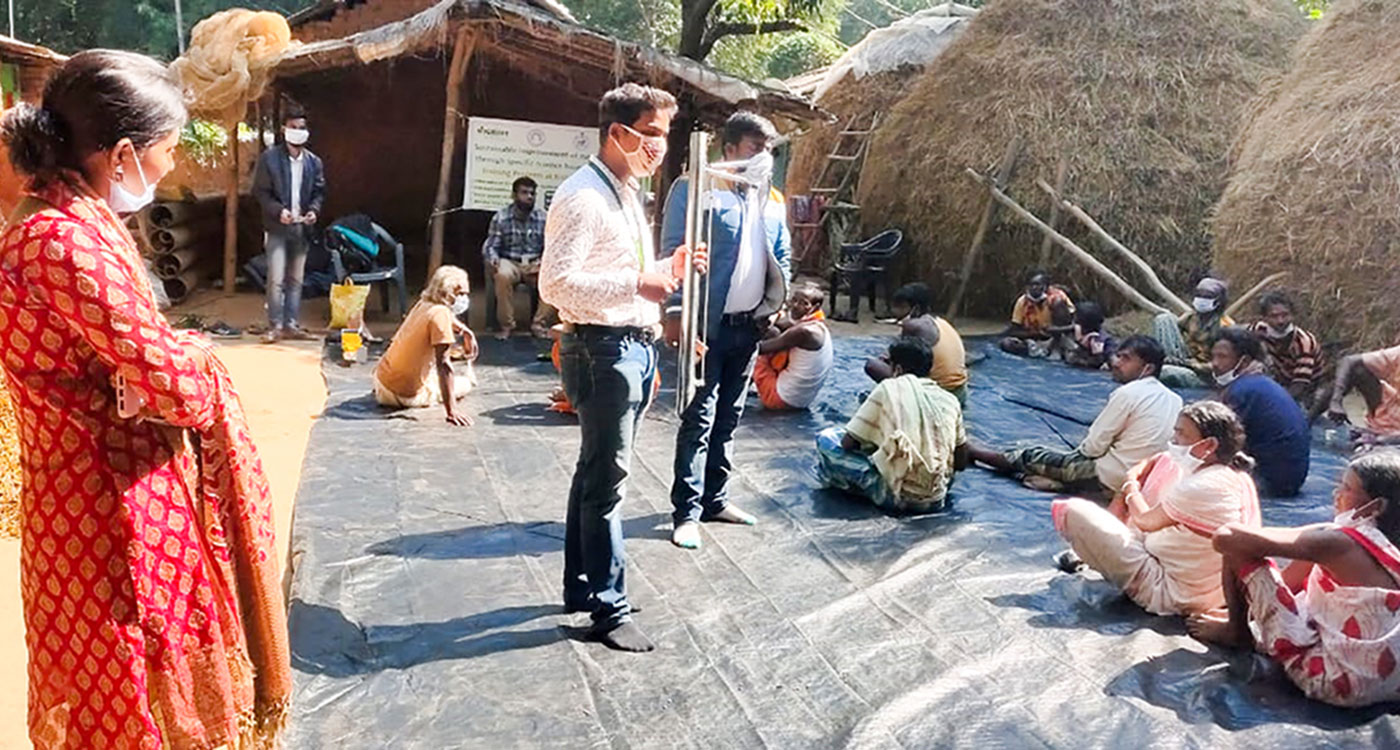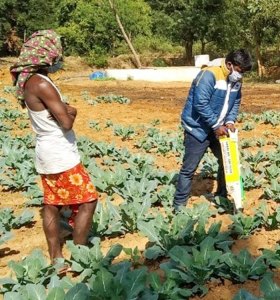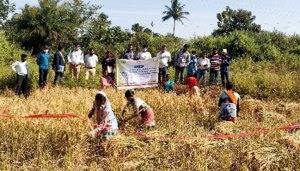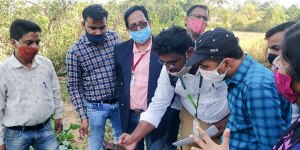
Demonstration of seed dibbler at Bhonsuli village, Nabarangpur district. Photo: ICRISAT Development Center
A series of capacity-building programs, including the use of Plantix – a mobile app to detect pests/diseases in crops, best practices in chickpea and mustard farming, and demonstrations of micronutrient addition to soil, was recently conducted in four districts in Odisha state, India. Despite the prevailing conditions, officials successfully carried out the programs while following all precautions to prevent the spread of COVID-19.
Creating awareness through field demonstrations

Demonstration of easy planter at Bhonsuli village, Nabarangpur district. Photo: ICRISAT Development Center
During a hands-on training session at Bhonsuli village, Kosagumuda block in Nabarangpur district on 3 December 2020, more than 40 farmers were guided on packages and practices of mustard (Hybrid 7701 variety) and chickpea (JAKI 9218), including the seed rate to be followed, spacing, sowing methods, nipping in chickpea, irrigation scheduling, and humic acid and neem oil for future use activities. Officials demonstrated the use of seed dibbler and easy planter.
On the same day, an exposure visit was conducted for more than 70 project farmers at the Odisha Livelihood Mission (OLM)-funded project sites of ICRISAT, in Muniguda block, Singari village, Rayagada district. At Singari, a crop cutting experiment (CCE) was conducted in the paddy field of Mr Purnima Kashi, a beneficiary farmer of the project, who has adopted micronutrient application as an improved and scientific cultivation practice. The CCE was done in a 25-square meter area, and compared with the same farmer’s conventional practices. While he obtained 15.4 kg grain yield, (6,200 kg/ha) with this method, the yield obtained with the conventional practice was 13.5 kg, (5,400 kg/ha). This showed that the micronutrient application gave significant results over conventional practice.
Training on Plantix

Farmers participate in the CCE in Singari village, Rayagada district. Photo: ICRISAT Development Center
A group of 33 progressive farmers in Mukhubedei village of Semiliguda block in Koraput district learnt to use the mobile application Plantix for real-time detection and identification of pests/diseases. This training, conducted on 2 December 2020, was on the specially developed version of the app that is in Odiya, the local language.
A similar session was conducted on 3 December for 45 farmers in Anukumpa village of R Udayagiri block in Gajapati district; 40 farmers from Bhonsuli village in Nabarangpur district and 70 from Munigada block villages in Rayagada district. The training program was also reported in the ‘Samaja’ a local newspaper.
Under the OLM program, the ICRISAT Development Center (IDC) has been working in a mission mode, following a holistic, scientific approach. Apart from undertaking mass-scale plantation of coconuts saplings in Puri and Khorda districts which were affected by cyclone FANI in 2019, the project also focuses on creating and supplementing agriculture-based livelihoods for resource-poor farmers of the four tribal districts of Koraput, Nabarangpur, Rayagada, and Gajapati. Interventions include integrated nutrient management (soil test-based nutrient application etc.), integrated pest management, best management practices in agricultural crops, scientific vegetable cultivation, and value addition to primary produce.
Progress despite COVID-19

Demonstration of Plantix App in Singari village, Rayagada district. Photo: ICRISAT Development Center
Despite the COVID-19 pandemic, the project has been moving rapidly since its inception, and farmers and staff have been following the required safety guidelines to ensure the program’s progress and success. During kharif (rainy) season 2020, altogether 1932 field demonstrations were carried out, with ICRISAT supplying the required inputs.
A consortium of partners including the World Vegetable Center, Odisha University of Agriculture & Technology (OUAT), Bhubaneswar and local organizations supported ICRISAT in these events conducted successfully in the districts of Koraput, Nabarangpur, Rayagada and Gajapati. The District Project Manager, Block Project Manager, Odisha Livelihoods Mission; scientists from Krishi Vigyan Kendra (KVK); scientific officers from ICRISAT; OLM officials; staff from the World Vegetable Center and representatives from the local NGOs were present at the various events.


